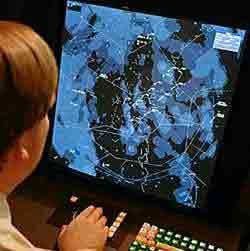One of my favorite games on my phone is Air Control. You’ve got control of an airfield and you direct airplanes to the ground in an orderly and safe manner. It starts off with only a few planes but by the time you’ve played the game for a few minutes, you’re already juggling a dozen planes landing in three different locations.
I’ve become fairly good at the game, registering in the top 5 percent of players, but I’m not turning in my computer keyboard just yet for a seat in the control tower. Even from the game itself, I find myself in a cold sweat as handfuls of airplanes circle around my tiny screen looking for a safe runway.
The job has it’s perks, I’m sure, but the Federal Aviation Administration has a bigger problem than just sleepy and distracted employees.
Watching movies and sleeping on the job
Of course, having a less-than-engaged workforce on the job is a problem. Just yesterday it was announced that an air traffic controller in Cleveland was watching a movie while on the job:
The Cleveland incident occurred early Sunday morning, according to an FAA statement. The agency stated that the controller was watching a DVD while working a radar position at the Cleveland Air Route Traffic Control Center.
“For a little more than three minutes, the controller’s microphone was inadvertently activated, transmitting the soundtrack of the movie over the radio frequency for that airspace,” the statement read. “The problem was brought to air traffic control’s attention by the pilot of a military aircraft using an alternate frequency.”
The FAA forbids the use of video players and other devices on the radar room floor, according to the statement.
The frequent traveler in me gets a bit nervous about stories like this and ones like air traffic controllers sleeping on the job. As an HR professional, I understand that even the most critical positions have employees who treat it just like any other job. Anyone who has dealt with a lousy doctor or police officer can relate to this.
And while it may be a tad naive to assume that all of the people in these critical positions are great employees on the top of their game, it seems many people do assume just that. Maybe that won’t happen for long though.
Bigger problems: perception and replacements
Of course, the bigger issue is that the job of air traffic controller itself is a tough one to fulfill. And while it may billed as a stressful position, many of them are not. In fact, a majority of the stress myth comes from controllers who work at the busiest airspaces in the country, and most of the positions do not have that sort of stress. The FAA has done studies (available here in PDF format) that show that while stress levels expressed by controllers are slightly higher, they weren’t wildly out of the norm.
Once properly trained, most air controllers experience similar stresses that many people do at work. They are supposed to be engaged in the job for 90-120 minutes at a time, and they are given time off in between these periods of work.
The problem is that staffing shortages have made the time between shifts more problematic. That can lead not only to sleepiness but also to mental errors on the part of the controller.
In the bigger scheme of things, it isn’t going to get any easier for the FAA. They expect over half of their workforce to retire in the next decade and will have to hire over 12,000 new controllers over that same time period. To make things more difficult, they have to look hard into their crystal ball as each new recruit takes 3-5 years in order to be able to fully take over an air control position.
Regaining trust
I don’t know many people who are going to change their plans for flying because of a few sleepy controllers. What I can tell you is that it does impact public perception of both flying and the air traffic controllers themselves. Every time I say I’m going on a flight, someone may give me a hard time and hope that the air traffic controller isn’t “sleeping at the switch,” so to speak.
There’s a cumulative toll of that perception, one that the FAA needs to address before it gets out of hand (both through policy and employee selection).
While it may not be as high stress job as advertised, it is high enough impact and public enough that there should be emphasis on getting it right. More so than perhaps any position at the FAA, air traffic controllers are the most critical employee to have a positive perception of in both the employment and consumer market.
